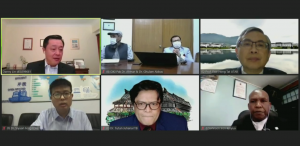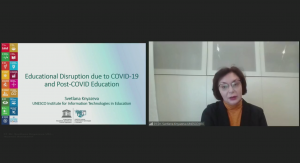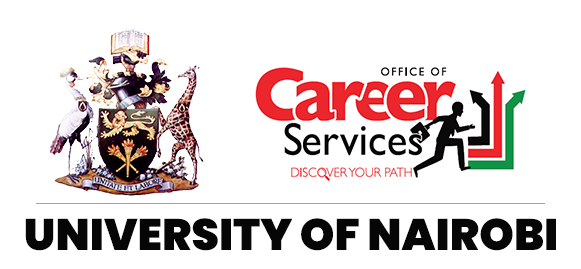[Shenzhen, China, November 11, 2020] On November 10, Huawei hosted the Global Forum on “ICT Education, Education via ICT” within the framework of the Global Final of the Huawei ICT Competition 2019–2020. Forum participants included representatives of the UNESCO as well as several Chinese and international universities, who shared their ideas on the direction of ICT education and the successful practices of Huawei ICT academies. They also discussed ICT talent development during and after the pandemic.
The University of Nairobi was represented by Mr. Johnson Ireri Kinyua, Director, Office of Career Services
 Live webcast of the Global Forum
Live webcast of the Global Forum
The forum welcomed Ms. Knyazeva, Director of the UNESCO Institute for Information Technologies in Education. She noted the important role of online education that uses advanced ICT technologies in countering the impact of the COVID-19 pandemic. In April, 74% of students were unable to access education due to the pandemic, a number that has since dropped to 13% as classes went online. The UNESCO will continue to form a global education alliance with more than 140 members, including Huawei. The alliance will provide necessary resources, build digital learning management systems, offer online courses at scale, and set up mobile classrooms. It will also lobby for increased public investment in online education. This aims to reduce the impact of the pandemic and ultimately achieve a more open and flexible global education system.

Address by Ms. Knyazeva, Director of the UNESCO Institute for Information Technologies in Education
Mr. Siyuan Feng, from the UNESCO International Center for Higher Education Innovation, highlighted the fact that developing countries are currently facing an immense challenge in digitally transforming education systems. To address it, the UNESCO has set up an international online education institute. The organization invited Huawei to join the effort to build-up ICT capacity among teachers and relevant admin personnel, who can in turn support students’ learning in ICT. This will contribute to national digitalization, creating a positive cycle of digital transformation.
Professor Zhuang Rongxia, from the Smart Learning Institute of Beijing Normal University, discussed China’s approach and the measures it has taken to prevent classes from being suspended due to COVID-19. She listed three key resources needed for successful online education. First and foremost, online education requires reliable network infrastructure. Second, education systems need to provide flexible teaching methods, ensuring that students can adapt in terms of time, place, and learning resources. Third, interactive learning resources and teaching methodologies are key for a more effective online education.
Deans and professors from several other universities shared the successful practices of Huawei ICT academies, the steps they took and best practices in dealing with the pandemic, and their plans for the future of online education. The universities include Bandung Institute of Technology in Indonesia, Universiti Tunku Abdul Rahman in Malaysia, University of Perugia in Italy, University of Nairobi in Kenya, and GIK Institute in Pakistan.
As the pandemic continues to unravel across the world, the inequality in education across regions and countries is no longer possible to ignore. Remote, online education offers a viable solution for more equal access. However, to ensure scaled access to online education, it is necessary to provide stable communication platforms, appropriate teaching resources, easy-to-use learning tools, and effective support services to students and teachers around the world.
Looking forward, Huawei will invest more in software and hardware, continue its Learn ON plan, optimize online education platforms, develop more high-quality MOOC resources, and share its online education experience to promote education with ICT technologies. Our aim is to provide more people with access to quality education, ensuring that no one is left behind in the digital world.

